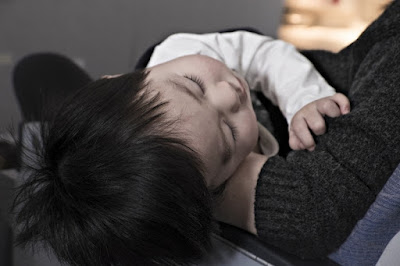Abstract thought is developed with the help of hand-eye-brain coordination, interaction with the environment, and the baby's first language experiences. Exposure to language early on in a child's development is vital: through gestures, body language, facial expressions, and the sound of the human voice. In the first few months the baby will babble vowel sounds; and by listening to others, he will then try to reproduce sounds himself, and strengthen his capacity for speech later on. When the adult mimics the baby, she reinforces the baby's attempts at vocalization, and the baby will babble more. This is why pacifiers are not recommended past the earliest months, it inhibits the babbling process, and prolongs speech development.
Pacifiers allow for sucking but not for making sounds, an important part of language development. When your baby cries more because he no longer has a pacifier, he is strengthening his vocal cords, albeit putting a strain on mom and dad's ears! A baby who is "pacified" is quieter, but it is to the sacrifice of his oral motor development.
By five months, the baby can make several consonant sounds, and soon strings them together with vowel sounds, the most common being "da-da"--this is called "canonical babbling." Now he will be all ears!
Parents can talk to the baby at every given opportunity, including the naming of objects in and around the baby's environment. By ten months the baby will begin understanding some of the language spoken around him. He begins to comprehend that language can convey meaning. "Bye-bye" is not just a sound mom makes when she leaves for work, it has meaning. Sounds have meanings.
He will understand more and more the meaning of words spoken, but will have a difficult time conveying words himself; but he will try making up words, until one day, he gets them right! In the meantime, at around the same age, he will try to convey meaning through gestures, like pointing.
The adult can reinforce his language by responding back with a few simple words. For example, the baby is pointing to his Teddy bear, the adult can say, "Teddy bear!" And give it to the baby, repeating the word a few more times.
When a child is twelve months, he may master up to six words, and as many as fifty by age fifteen months (and later for pacifier babies). By the time the baby has learned fifty words, an explosion happens, and he will learn several words PER DAY (as many as one every two waking hours) until the age of five!
It also is during this early language explosion (from fifteen to twenty-four months) that the brain is rapidly forming the cerebral cortex--the part of the brain where words or stored and retrieved. ~Lisa Nolan
(This post was originally published at Montessori on a Budget.)
Top Photo Credit: Foter.com
 |
| Photo copyrighted by Yvonne Goodrich. |

